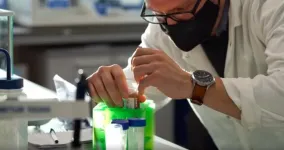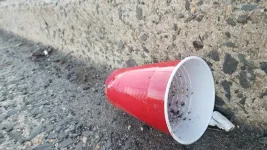(Press-News.org) Researchers have created a plant-based, sustainable, scalable material that could replace single-use plastics in many consumer products.
The researchers, from the University of Cambridge, created a polymer film by mimicking the properties of spider silk, one of the strongest materials in nature. The new material is as strong as many common plastics in use today and could replace plastic in many common household products.
The material was created using a new approach for assembling plant proteins into materials which mimic silk on a molecular level. The energy-efficient method, which uses sustainable ingredients, results in a plastic-like free-standing film, which can be made at industrial scale. Non-fading 'structural' colour can be added to the polymer, and it can also be used to make water-resistant coatings.
The material is home compostable, whereas other types of bioplastics require industrial composting facilities to degrade. In addition, the Cambridge-developed material requires no chemical modifications to its natural building blocks, so that it can safely degrade in most natural environments.
The new product will be commercialised by Xampla, a University of Cambridge spin-out company developing replacements for single-use plastic and microplastics. The company will introduce a range of single-use sachets and capsules later this year, which can replace the plastic used in everyday products like dishwasher tablets and laundry detergent capsules. The results are reported in the journal Nature Communications.
For many years, Professor Tuomas Knowles in Cambridge's Yusuf Hamied Department of Chemistry has been researching the behaviour of proteins. Much of his research has been focused on what happens when proteins misfold or 'misbehave', and how this relates to health and human disease, primarily Alzheimer's disease.
"We normally investigate how functional protein interactions allow us to stay healthy and how irregular interactions are implicated in Alzheimer's disease," said Knowles, who led the current research. "It was a surprise to find our research could also address a big problem in sustainability: that of plastic pollution."
As part of their protein research, Knowles and his group became interested in why materials like spider silk are so strong when they have such weak molecular bonds. "We found that one of the key features that gives spider silk its strength is the hydrogen bonds are arranged regularly in space and at a very high density," said Knowles.
Co-author Dr Marc Rodriguez Garcia, a postdoctoral researcher in Knowles' group who is now Head of R&D at Xampla, began looking at how to replicate this regular self-assembly in other proteins. Proteins have a propensity for molecular self-organisation and self-assembly, and plant proteins in particular are abundant and can be sourced sustainably as by-products of the food industry.
"Very little is known about the self-assembly of plant proteins, and it's exciting to know that by filling this knowledge gap we can find alternatives to single-use plastics," said PhD candidate Ayaka Kamada, the paper's first author.
The researchers successfully replicated the structures found on spider silk by using soy protein isolate, a protein with a completely different composition. "Because all proteins are made of polypeptide chains, under the right conditions we can cause plant proteins to self-assemble just like spider silk," said Knowles. "In a spider, the silk protein is dissolved in an aqueous solution, which then assembles into an immensely strong fibre through a spinning process which requires very little energy."
"Other researchers have been working directly with silk materials as a plastic replacement, but they're still an animal product," said Rodriguez Garcia. "In a way we've come up with 'vegan spider silk' - we've created the same material without the spider."
Any replacement for plastic requires another polymer - the two in nature that exist in abundance are polysaccharides and polypeptides. Cellulose and nanocellulose are polysaccharides and have been used for a range of applications, but often require some form of cross-linking to form strong materials. Proteins self-assemble and can form strong materials like silk without any chemical modifications, but they are much harder to work with.
The researchers used soy protein isolate (SPI) as their test plant protein, since it is readily available as a by-product of soybean oil production. Plant proteins such as SPI are poorly soluble in water, making it hard to control their self-assembly into ordered structures.
The new technique uses an environmentally friendly mixture of acetic acid and water, combined with ultrasonication and high temperatures, to improve the solubility of the SPI. This method produces protein structures with enhanced inter-molecular interactions guided by the hydrogen bond formation. In a second step the solvent is removed, which results in a water-insoluble film.
The material has a performance equivalent to high performance engineering plastics such as low-density polyethylene. Its strength lies in the regular arrangement of the polypeptide chains, meaning there is no need for chemical cross-linking, which is frequently used to improve the performance and resistance of biopolymer films. The most commonly used cross-linking agents are non-sustainable and can even be toxic, whereas no toxic elements are required for the Cambridge-developed technique.
"This is the culmination of something we've been working on for over ten years, which is understanding how nature generates materials from proteins," said Knowles. "We didn't set out to solve a sustainability challenge -- we were motivated by curiosity as to how to create strong materials from weak interactions."
"The key breakthrough here is being able to control self-assembly, so we can now create high performance materials," said Rodriguez Garcia. "It's exciting to be part of this journey. There is a huge, huge issue of plastic pollution in the world, and we are in the fortunate position to be able to do something about it."
INFORMATION:
Researchers from North Carolina State University have turned a longstanding challenge in DNA data storage into a tool, using it to offer users previews of stored data files - such as thumbnail versions of image files.
DNA data storage is an attractive technology because it has the potential to store a tremendous amount of data in a small package, it can store that data for a long time, and it does so in an energy-efficient way. However, until now, it wasn't possible to preview the data in a file stored as DNA - if you wanted to know what a file was, you had to "open" the entire file.
"The advantage to our technique is that it is more efficient ...
DALLAS, June 10, 2021 -- The distance a stroke patient must travel to receive care at a certified stroke center differs by race, age, income and insurance status, with the largest disparities found among rural residents and American Indians, according to a combined analysis of U.S. census data and road maps published today in Stroke, a journal of the American Stroke Association, a division of the American Heart Association.
Treatment for ischemic stroke, a blockage in an artery that supplies blood to the brain, restores blood flow to the brain. Rapid treatment is essential to reduce disability. Blood flow may be reestablished by administering intravenous clot-busting medication within 4.5 hours after the onset of stroke ...
Polymetallic nodules and crusts cover many thousands of square kilometres of the world's deep-sea floor. They contain valuable metals and rare earth elements and are therefore of great economic interest. To date, there is no market-ready technology for deep-seabed mining. But it is already clear that interventions in the seabed have a massive and lasting impact on the areas affected. This is also confirmed by a study now published by Tanja Stratmann from the Max Planck Institute for Marine Microbiology in Bremen, Germany, and researchers from the Senckenberg am Meer Institute in Wilhelmshaven, Germany, and the Dutch research institute NIOZ.
In their study, Stratmann and her colleagues used data from ...
When nature vanishes, people of color and low-income Americans disproportionally lose critical environmental and health benefits--including air quality, crop productivity and natural disease control--a new study in Nature Communications finds.
The University of Vermont research is the first national study to explore the unequal impacts on American society--by race, income and other demographics--of projected declines in nature, and its many benefits, across the United States.
Focusing on three vital ecosystem services--air quality, crop pollination, and control of insect-borne disease (West Nile virus), researchers project that these benefits of nature will decrease for non-white people by an average of 224%, ...
Can you imagine one day using a telescope as thin as a sheet of paper, or a much smaller and lighter high-performance camera? Or no longer having that camera bump behind your smartphone?
In a paper published in Nature Communications, researchers from the University of Ottawa have proposed a new optical element that could turn these ideas into reality by dramatically miniaturizing optical devices, potentially impacting many of the applications in our lives.
To learn more about this project, we talked to lead author Dr. Orad Reshef, a senior postdoctoral fellow in the Robert Boyd Group, and research lead Dr. Jeff Lundeen, who is the Canada Research Chair in Quantum Photonics, Associate Professor in the ...
A class of drug called monoamine oxidase inhibitors is commonly prescribed to treat depression; the medications work by boosting levels of serotonin, the brain's "happiness hormone."
A new study by UCLA researchers suggests that those drugs, commonly known as MAOIs, might have another health benefit: helping the immune system attack cancer. Their findings are reported in two papers, which are published in the journals Science Immunology and Nature Communications.
"MAOIs had not been linked to the immune system's response to cancer before," said Lili Yang, senior author of the study and a member of the Eli and Edythe Broad Center of Regenerative Medicine and Stem Cell Research at UCLA. "What's especially exciting is that this is a very well-studied and ...
The largest study of its kind has unveiled new insights into how genes are regulated in dementia, including discovering 84 new genes linked to the disease.
Led by the University of Exeter, the international collaboration combined and analysed data from more than 1,400 people across six different studies, in a meta-analysis published in Nature Communications. These studies had used brain samples from people who had died with Alzheimer's disease. The project, funded by Alzheimer's Society and supported by the Medical Research Council and the National Institutes for ...
UNIVERSITY OF TORONTO & CARLETON UNIVERSITY
New research published online in the journal Substance Use & Misuse is good news for those struggling with alcohol dependence: the possibility of ending this dependency gets easier with age. Moreover, more than half of individuals who have been dependent on alcohol are free of any addictions or mental illness, and nearly 40% are in excellent mental health.
Using data drawn from Statistics Canada's Canadian Community Health Survey-Mental Health, researchers examined a nationally representative sample of 820 adult Canadians with a history of alcohol dependence to 19,945 who had never been addicted to alcohol.
They found that in the past year, 71% of ...
PISCATAWAY, NJ - Underage youth consumed $17.5 billion worth, or 8.6 percent, of the alcoholic drinks sold in 2016. Products from three alcohol companies--AB Inbev, MillerCoors and Diageo--accounted for nearly half of youth consumption, according to a new study published in the Journal of Studies on Alcohol and Drugs.
Data collected in a landmark study of youth alcohol consumption by brand enabled the authors to calculate the first estimate in nearly 20 years of the monetary value of youth alcohol consumption. And for the first time, they were able to attribute those revenues to specific companies.
"The alcohol industry has said they don't want minors to drink, ...
ROCHESTER, Minn. -- Treating transplant patients with mild to moderate cases of COVID-19 with monoclonal antibodies is safe and helps prevent serious illness, according to a Mayo Clinic study recently published in Open Forum Infectious Diseases. These results are especially important because transplant patients who are infected with COVID-19 have a higher risk of severe illness and death.
"Monoclonal antibody therapy is really important for the transplant population because they are less likely to develop their own immunity. Providing them with these antibodies helps them recover from COVID-19," says Raymund Razonable, M.D., a Mayo Clinic infectious diseases specialist and the study's senior ...



